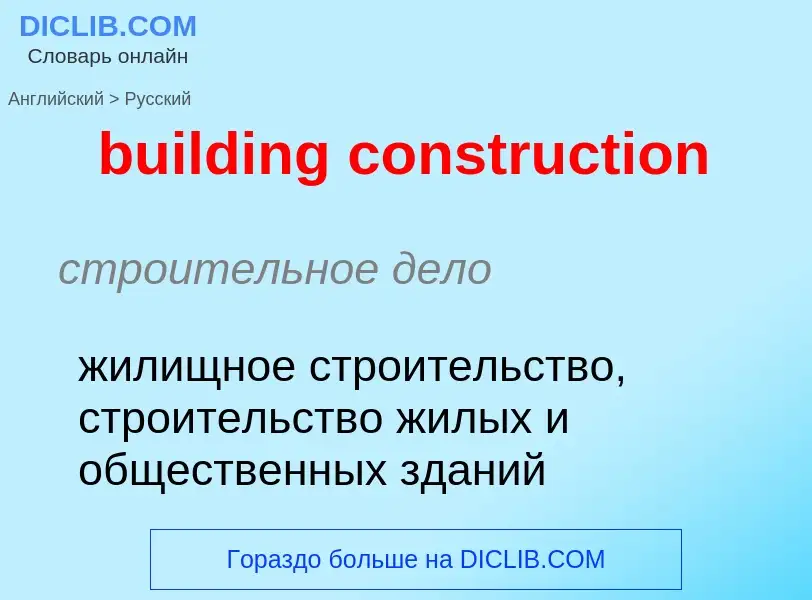Перевод и анализ слов искусственным интеллектом ChatGPT
На этой странице Вы можете получить подробный анализ слова или словосочетания, произведенный с помощью лучшей на сегодняшний день технологии искусственного интеллекта:
- как употребляется слово
- частота употребления
- используется оно чаще в устной или письменной речи
- варианты перевода слова
- примеры употребления (несколько фраз с переводом)
- этимология
building construction - перевод на русский
строительное дело
жилищное строительство, строительство жилых и общественных зданий
общая лексика
строительная промышленность
строительная индустрия
строительное дело
строительство (как отрасль народного хозяйства)
2) здание; строение; сооружение; конструкция
3) толкование
- construction in progress
- construction put in place
- broad construction
- housing construction
- imaginative construction
- incompleted construction
- model construction
- noncontracted farm construction
- nonresidential construction
- project construction
- public construction
- residential construction
- restrictive construction
- turnkey construction
общая лексика
проект строительства
строительный объект
строительное дело
строительный объект, объект строительства
общая лексика
строительные работы
множественное число
(строительное) сооружение
Определение
Википедия
.jpg?width=120)
Construction is a general term meaning the art and science to form objects, systems, or organizations, and comes from Latin constructio (from com- "together" and struere "to pile up") and Old French construction. To construct is the verb: the act of building, and the noun is construction: how something is built, the nature of its structure.
In its most widely used context, construction covers the processes involved in delivering buildings, infrastructure, industrial facilities and associated activities through to the end of their life. It typically starts with planning, financing, and design, and continues until the asset is built and ready for use; construction also covers repairs and maintenance work, any works to expand, extend and improve the asset, and its eventual demolition, dismantling or decommissioning.
The construction industry contributes significantly to many countries' gross domestic products (GDP). Global expenditure on construction activities was about $4 trillion in 2012. In 2022, expenditure on the construction industry exceeded $11 trillion a year, equivalent to about 13 percent of global GDP. This spending was forecast to rise to around $14.8 trillion in 2030.
Although the construction industry promotes economic development and brings many non-monetary benefits to many countries, it is one of the most hazardous industries. For example, about 20% (1,061) of US industry fatalities in 2019 happened in construction.

.jpg?width=200)
![foundation construction]]. foundation construction]].](https://commons.wikimedia.org/wiki/Special:FilePath/-37 Construction.jpg?width=200)
![Construction along [[Ontario Highway 401]], widening the road from six to twelve travel lanes Construction along [[Ontario Highway 401]], widening the road from six to twelve travel lanes](https://commons.wikimedia.org/wiki/Special:FilePath/401-403-410 and Construction crop.png?width=200)
![A truck operator at [[Al Gamil]], the largest construction company in [[Djibouti]] A truck operator at [[Al Gamil]], the largest construction company in [[Djibouti]]](https://commons.wikimedia.org/wiki/Special:FilePath/Algamildj.jpeg?width=200)
![[[Ironworker]]s erecting the steel frame of a new building at [[Massachusetts General Hospital]] in [[Boston]] [[Ironworker]]s erecting the steel frame of a new building at [[Massachusetts General Hospital]] in [[Boston]]](https://commons.wikimedia.org/wiki/Special:FilePath/Construction Workers.jpg?width=200)

![ALMA]]) Operations Support Facility (OSF) construction site ALMA]]) Operations Support Facility (OSF) construction site](https://commons.wikimedia.org/wiki/Special:FilePath/European Antennas Under Construction.jpg?width=200)
![The National Cement Share Company of [[Ethiopia]]'s new plant in [[Dire Dawa]] The National Cement Share Company of [[Ethiopia]]'s new plant in [[Dire Dawa]]](https://commons.wikimedia.org/wiki/Special:FilePath/Factory of National Cement Share Company.jpg?width=200)
![United States of America]] United States of America]]](https://commons.wikimedia.org/wiki/Special:FilePath/Industrial-installation.jpg?width=200)
![Construction of the Federal Reserve building in [[Kansas City, Missouri]] Construction of the Federal Reserve building in [[Kansas City, Missouri]]](https://commons.wikimedia.org/wiki/Special:FilePath/Liberty Memorial 043.jpg?width=200)
![Digging the foundation for a building construction in [[Jakarta]], [[Indonesia]] Digging the foundation for a building construction in [[Jakarta]], [[Indonesia]]](https://commons.wikimedia.org/wiki/Special:FilePath/Mall culture jakarta57.jpg?width=200)
![[[Shasta Dam]] under construction in June 1942 [[Shasta Dam]] under construction in June 1942](https://commons.wikimedia.org/wiki/Special:FilePath/Shasta dam under construction new edit.jpg?width=200)
 3 Det. 4, place trimming on birthing spaces being built for Afg.jpg?width=200)
![Apartment complex under construction in [[Daegu]], [[South Korea]] Apartment complex under construction in [[Daegu]], [[South Korea]]](https://commons.wikimedia.org/wiki/Special:FilePath/UnderConstruction-Apt.jpg?width=200)
